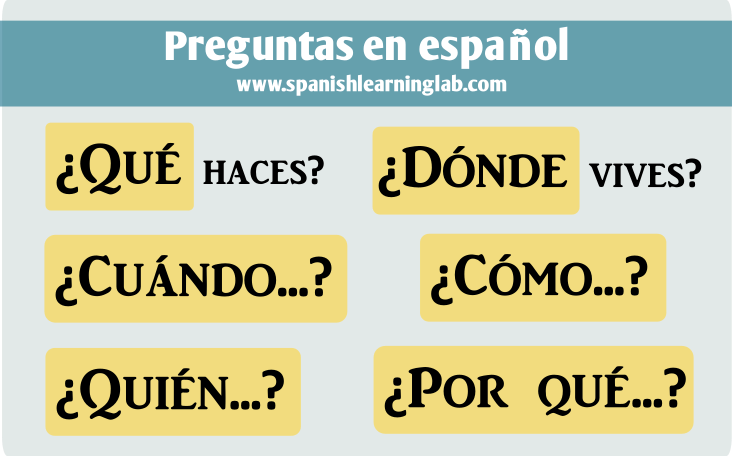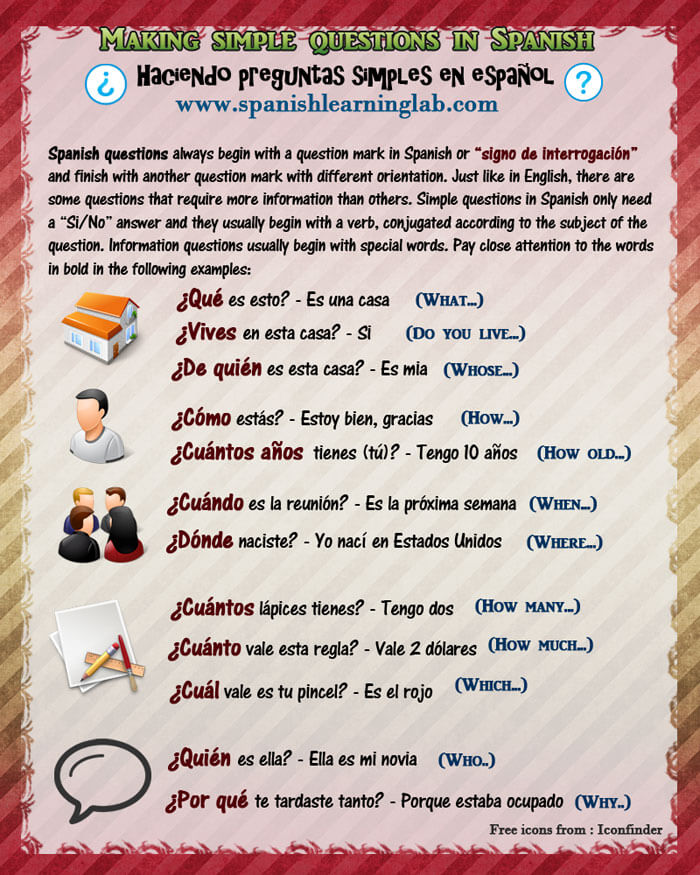In the previous lesson, we learned how to ask simple YES/NO questions and their punctuation. They are very important, but sometimes we will need more than a “SI” or a “NO”. In this lesson, we will introduce the most common ways for asking questions in Spanish. We will study several examples using Spanish question words to get specific information such as occupations, age, feelings and more. Comencemos…
Vocabulary Introduction: A list of Spanish Question Words
Spanish information questions or “Interrogaciones parciales” are a special type of questions because we need more than a simple SI/NO answer. In order to get information, e.g. where places are located or what types of food a restaurant offers, we need to use Spanish question words such as the ones highlighted in yellow in the picture below:

CÓMO (How), CUÁNDO (When), POR QUÉ (Why), DÓNDE (Where), CUÁL (Which), QUÉ (What), CUÁNTOS (how many) and others.
When asking questions in Spanish, it is important to use the right question word to get the information you need, just like in the examples in the picture below.

How to Form Spanish Questions: Structure and Punctuation
How to form questions in Spanish
Unlike English, most normal sentence in Spanish could be easily transformed into a question by simply changing the intonation at the moment of speaking. Most questions follow the structure for basic sentences with the addition of question marks and perhaps a question word, just like we did in the examples in the picture. Pay attention to how you can transform these sentences into questions in Spanish:
- Sentence: El carro es nuevo. / Question: ¿El carro es nuevo?
- Sentence: Doña Socorro vive en Acapulco. / Questions: ¿Doña Socorro vive en Acapulco?
Know that question words in Spanish will be placed before the main verb. Although you could transform any sentence into question, things change a bit when it comes to using questions words. Generally, we will follow this structure for them:
Spanish question word + conjugated verb + Subject (optional) + content of our question
Likewise, for Spanish information questions, we will begin with a question mark, then add a question word such as “Cuál” (which) or “Dónde” (where), then a verb conjugated in the present or any other tense, and finally the subject of the sentence. Thus, to get an answer like “Vivo en Miami” (I live in Miami), first we must identify that we are talking about a place and then use the appropriate interrogative word, that is, “Dónde,” to ask “Where do you live ( you)?” (En dónde vives (tú)?). The subject is optional in most cases.
- Sentence: Celebraremos su cumpleaños mañana. / Question: ¿Cuándo celebraremos su cumpleaños?
- Sentence: Él es mi amigo. / Question: ¿Quién es él?
Punctuation in Spanish questions
Notice that all Spanish questions beginning with the equivalent Wh- words in Spanish need tilde over one of the vowels, just like “Qué” or “Cómo”. When they are not written with tilde, then they will be considered a part of the sentence instead, e.g. “Tengo que limpiar” (I have to clean) and “Recuerda que hoy es mi cumpleaños” (Remember that today is my birthday).
Remember that all questions in the language must begin with an inverted question mark and finish with a normal one. Also, the words “Por qué” and “Porque” have different spelling. The first is only used meaning WHY in Spanish, whereas the second will be used meaning BECAUSE (without tilde).
Asking Questions in Spanish: Examples using Question Words
It is time to see how question words are really used when asking questions in Spanish. The chart below includes a list of basic Spanish questions and answers. They are about jobs, names, age and other important things. You can see more of these types of questions in other lessons in the site. Also, pay attention to the structure used to form these questions and the punctuation rules explained above.
|
¿Qué haces? / ¿En qué trabajas? – Soy doctor
What do you do?
|
|
¿Dónde lo encontraste? – Lo encontré en la sala
Where did you find it?
|
|
¿Cuál es tu nombre?/ ¿Cómo te llamas? – Me llamo Tommy
What is your name? – My name is Tommy
|
|
Which one do you prefer? – I prefer the red one
|
|
How old are you? – I am 20 years old
|
|
How do you feel today?
|
|
¿Cuántos hijos tienes? – Tengo 3 hijos
How many children do you have?
|
|
¿De quién es este libro? – Este libro es de ella
Whose is this book? – This book is hers
|
|
¿Quién va a ayudarte? – Mi amiga va a ayudarme
Who is going to help you? – My friend is going to help me
|
|
¿Por qué estás haciendo eso? – Porque es parte de mi tarea
Why are you doing that? – Because it is part of my homework
|
Related Spanish Worksheets:
- Question Words in Spanish – PDF Worksheet
- Talking about Yourself in Spanish: PDF Worksheet
- Questions about the Family in Spanish: PDF Worksheet
- Making Questions in Spanish – PDF Worksheet
- Dialogues – Introductions and greetings in Spanish

very good this is the best website.